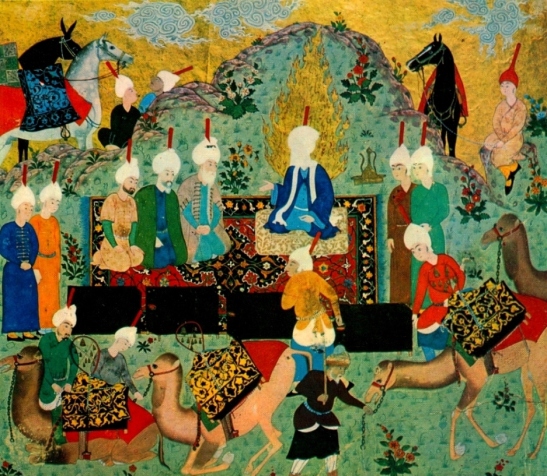
“The stars do not rule us, we rule the stars“-Imam ‘Ali ibn Abi Talib
“The tomb of Musa al-Kazim is a tried cure for all disease”–ash-Shafi’i
Named Muhammad, al-Baqir was his title and he was also known as Abu Jafar. [He was the son of Imam Zain ul ‘Abidin]. He was a highly respectable and learned scholar. There is a Tradition in Sahih Muslim concerning Hajj which is related to 200 religious issues. His reports are continued in Sahih and Sunnan. He was born in Madina in 57 Hijri and died in 114 Hijri. He is buried in Baqi. He was only nine years old at the time of Karbala. His mother is Umme Abdullah Bin Imam Hasan (radi allahu anhu).
Ahmad ibn Hajar al-Makki wrote in his book, As-Sawa’iq al-Muhriqa:
“Al-Imam Muhammad al-Baqir disclosed secrets of Ilm and Hikmah and unfolded the principles of spiritual and religious guidance. Nobody can deny his character, his God-given knowledge, his divinely-gifted Hikmah, and his obligation and gratitude towards the spreading of knowledge. He was a sacred and highly talented spiritual leader and for this reason, he was popularly titled al-Baqir, which means the expounder of knowledge. Kind in heart, spotless in character, saved by soul, and noble by nature, the Imam devoted all his time to worship. It is beyond the power of a man to count the deep impression of knowledge and guidance left by the Imam on the hearts of the faithful. His saying in devotion and abstinence, in knowledge and wisdom and in religious exercise and submission to Allah are so great in number that the volume of this book is quite insufficient to cover them all.”
Allamah Shibli Nu’mani writes, “the Ahli-Bayt were the fountainhead of Hadith, Fiqh, and in fact, all religious learning”
Abu Hanifah, who helped finance the claim to the Caliphate by Ibrahim ibn ‘Abd Allah Makhas ibn Hasan ibn ‘Ali (karram Allahu wajhu), sat for a long time at Imam Muhammad al-Baqir’s feet and acquired from him much valuable knowledge of Fiqh and Hadith from him which was not available anywhere else. Ibn Mutahhir al-Hilli, a famous Shi’i scholar, wrote in his books Nahjul-Haqq and Al-Minhaj al-Karamah Fi Tariqat al-Imamat that Imam Abu Hanifah learned from Imam Muhammad al-Baqir (Radhi Allahu ‘Anh) as well as from his son, Imam Ja’far as-Sadiq (Radhi Allahu ‘Anh), attaining high grades in his company. Al-Hilli also brings forth the fact that Abu Hanifah was given ijaza to give fatwa and perform ijtihad by at least three members of the Ahli-Bayt: 1.) Al-Imam Muhammad al-Baqir, 2.) his half-brother, Al-Imam Zayd bin Ali Shaheed and 3.) his son, Al-Imam Ja’far as-Sadiq. In light of this fact, Abdullah Suwaydi writes in his book, An-nahiyatu an-ta’ni Amir al-mu’minin Mu’awiya that
“Imam Abu Hanifah’s requirements of ijazat is testified by the faultless A’immah. To speak ill of Abu Hanifa would mean to deny the testimony of the Twelve Imams, who were sinless people. And this in its turn would be disbelief, according to the Shi’ah credo.”
In Sirat-e-Nu’man, it is written that “both the Ahlus-Sunnah and the Shiites are in agreement that Imam Abu Hanifah derived much of his learning from Imam Muhammad al-Baqir.” It is related in Al-Majmua az-Zuhdiyya that Imam Muhammad al-Baqir (Radhi Allahu ‘Anh) looked at Abu Hanifah (Radhi Allahu ‘Anh) and said:
“When those who defile my ancestor’s Shari’ah are on the increase, you will enliven it. You will be the savior of those with taqwa and the refuge of those with taqwa and the refuge of those who are confused! You will bring heretics round to the right path! Allah Ta’ala will help you!”
Muhammad bin Khavendesh bin Mahmud wrote in Rauza-tus-Safaa that “neither pen nor tongue can describe the merits and the traditions of Imam Abu Ja’far Muhammad bin ‘Ali al-Baqir.”

